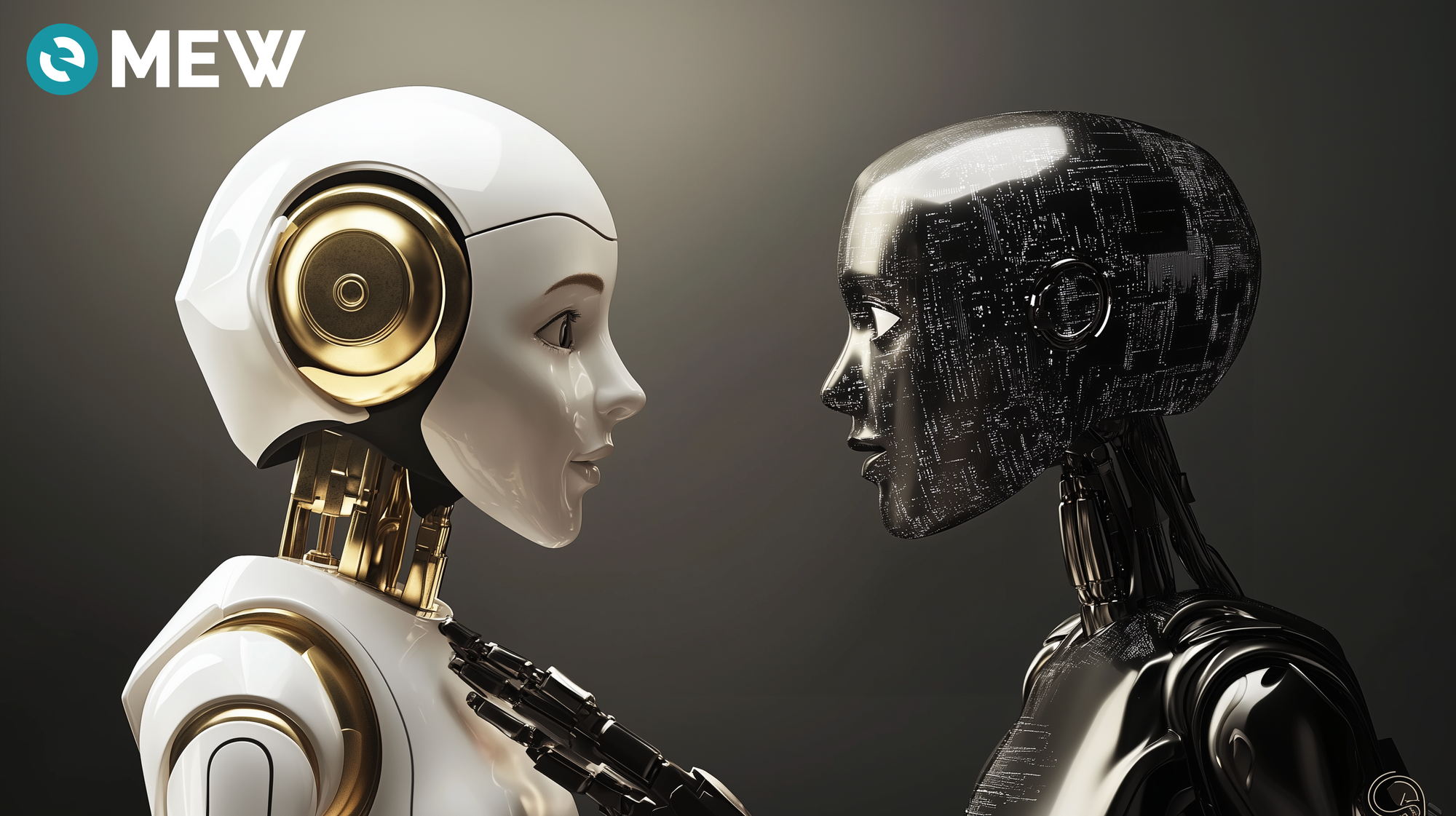In 2011, Marc Andreesen of a16z famously wrote that software is eating the world. In the past two years, AI has been eating the world – or at least trying to, with every company pushing AI in its products, with or without cause. In other news, crypto has been quietly eating the world for more than a decade, but it’s definitely got everyone’s attention now. What happens when crypto and AI come together?
AI and crypto have already intersected in many ways, but AI agents is the application that’s enjoyed the most hype recently. Let’s start there, and see whether there’s more to crypto AI than just a new kind of memecoin.
But first, what is crypto AI?
The fledgling space of crypto AI is actually quite broad, and covers all the ways AI can add to the crypto experience or vice versa – how crypto can help evolve the AI space.
Both crypto and AI are on the cutting edge of the tech world, attracting the most talented teams and the most innovative projects. For that reason alone, it’s a space to watch, but the usual cautions apply here as to all new tech. A lot of it is experimental (may not work as expected), there are hordes of scammers (they will try to take your money in very sophisticated ways), and the whole thing may run away from us and destroy the world (goes without saying).
That doesn’t mean it isn’t fun to explore.
AI agents
Speaking of fun. An AI agent is an AI model that can interact independently online, making it different from LLMs like ChatGPT which are closed from the internet and constrained by their dataset. This gives AI agents immense flexibility – they can carry out a wide variety of tasks online and onchain, completely independently.
The ones that have been in the crypto spotlight are those that create entities and accounts (see: ai16z, Luna, and Zerebro) capable of interacting on social media, making payments, and, yes, creating their own tokens. Agents can even interact on socials, arrange workflows, and exchange payments with each other.
The space has expanded so quickly that there are now distinct agent ecosystems, kind of like layer 2s in the Ethereum space – two popular ones are ai16z and Virtuals. When people say ‘trading AI agents’, they usually mean trading coins and NFTs created by those AI entities.
Most of these AI agent personalities are pretty much social influencers – for now. With time, they can evolve to more serious roles, like analysts, consultants, opinion leaders, and entire companies or brands, which will in turn affect the value of their tokens.
AI project tokens
Tokens created by AI agent entities are not to be confused with tokens of projects that are working on AI solutions, like Fetch.AI, The Graph, and SingularityNET. Many of these have been around for a while and were launched by teams comprising actual, normal (well, relatively normal) humans.
When you buy an AI agent token, you are speculating on the popularity and relevance of that specific entity, as well as its (their?) individual abilities. This is a lot like memecoins in terms of high volatility and taking a chance on a social trend. Buying established AI project tokens is a more general investment into the crypto AI space and the future of AI innovation, though admittedly less potentially lucrative in the short term (but also less likely to be rekt).
AI for trading
AI is good with data, and decentralized crypto trading has a lot of data, so it’s a great match. Importantly, crypto data is transparent onchain data that can be viewed by anyone via a blockchain explorer, including an AI agent. AI tools can be used to analyze onchain activity to provide insights into trading strategies and market trends. Some, like Etherscan’s Code Reader, employ AI to help users understand smart contract code.
Even more exciting is the possibility of AI agents that are like your own personal crypto adviser and manager. You could tell the agent ‘I want to buy this much ETH at these intervals, but only if the price is below a certain amount, and then deposit it into this type of protocol, but only if the yields are such and such, etc, etc’ – and the agent will work from your wallet to fulfill this assignment. Or, it might suggest a better strategy (and hopefully wait for your approval before implementing it…)
AI for building
Just like AI is already helping coders code, writers write, and data analysts analyze, it can help crypto builders… buidl.
And just like AI is helping users without technical expertise create graphics, web pages, and apps, it can also help you spin up your own NFTs and tokens. You can even use AI to launch… AI agent tokens (because AI making more AI is not scary at all).
The Eliza framework, based in the ai16z agent ecosystem, allows users without coding experience to create their own agents and assign parameters for the agents’ behavior. The Virtuals ecosystem also has its own agent launchpad. If you’ve always wanted to launch your own token or build a social brand from scratch, now it might be easier than ever to try.
The future
It’s not surprising that the most speculative and entertaining aspects of crypto AI have gotten the most attention so far. That’s the case with every new technology. But it’s not all memecoins –putting AI onchain can have meaningful and far reaching implications.
Beyond helping individual users optimize their own trades, AI can improve transaction handling on the blockchain, allowing for faster trading, more complex operations, and enhanced security. This can amplify the aspects of crypto trading that have already attracted institutions and governments to decentralized finance.
Given the kind of power AI models and agents have demonstrated, the protection of AI technology from centralization and privacy infringement is becoming more urgent. Combining AI with the decentralization and encryption of blockchain technology can be a way to address these concerns. Several companies in the space are already building that type of infrastructure, including Near Protocol, Render, and Bittensor.
Indeed, blockchain and cryptography might not be incidental, but essential for the development of AI going forward. Seeing how well AI agents are already collaborating with each other, and how some experts are predicting that zero-employee companies run by DAOs of AI agents are in the very near future… We might want to be able to see what they’re plotting – onchain.

